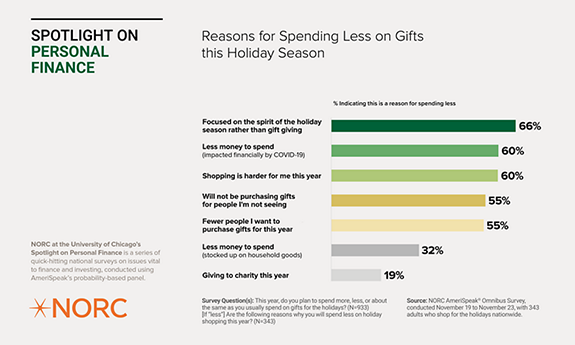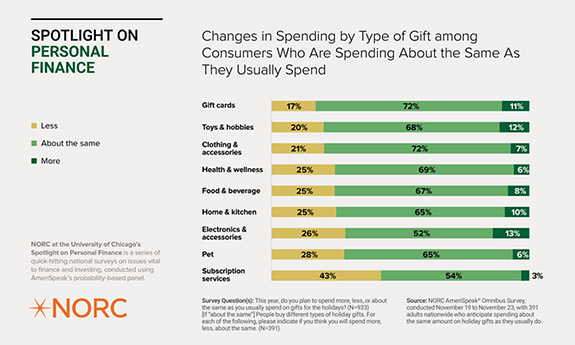1 in 3 Americans Plan to Spend Less this Holiday Season
Survey results show focus will be on the “spirit” of the holiday this year due to financial impact of COVID-19.
CHICAGO, Dec. 10, 2020 — More than one-third (37 percent) of people in the United States plan to spend less on holiday gift giving this year, according to a new NORC Spotlight on Personal Finance survey conducted using AmeriSpeak®. Plans to spend less are most prevalent among lower-income households, with over 40 percent of households earning less than $30,000 saying they plan to spend less, compared to a quarter (26 percent) of households with incomes over $100,000. Hispanic/Latino households are particularly likely to report less holiday gift spending—almost half (48 percent) report they plan to reduce spending.
Many who report decreased spending point to the negative financial impacts related to COVID-19 as a reason for spending less (60 percent), choosing instead to focus on the spirit of the holiday season and not gifts (66 percent).
“People have less to spend this year, and there appears to be a renewed focus on the spirit of the holiday season, rather than traditional consumerism and gift giving,” said Angela Fontes, director of the Behavioral and Economic Analysis and Decision-Making (BEAD) team at NORC. “When we do see spending, we see more intentional purchasing from businesses people want to support.”


Spotlight On Personal Finance:
Reasons For Spending Less on Gifts this Holiday Season
Some Americans plan to spend more this holiday season
While spending less is expected, given the impact of the COVID-19 pandemic, 10 percent of respondents indicated they will spend more on holiday gifts this year. Although African-American communities have been hard-hit by the COVID-19 pandemic, more African-American respondents indicate they will spend more (15 percent) than any other group. The most commonly cited reason for the increased spending is a desire to make sure friends and family have a nice holiday season in spite of the challenges of 2020 (81 percent).
COVID-19 increases shift to online holiday shopping
As the pandemic continues, the majority of Americans plan to shop completely or mostly online (62 percent). With this move to online, many shoppers are also planning ahead—over one-third of adults (36 percent) plan to begin shopping earlier than usual. Online shoppers are more likely to report starting earlier (37 percent of online shoppers compared to 26 percent of in-store shoppers are starting early).


Spotlight on Personal Finance:
Changes in spending by Type of gift among Consumers
Respondents also reported changes in what they planned to purchase this year. Those who were planning to spend overall about what they do in other years plan on increased spending on electronics and toys, and decreased spending on subscription services and pet-related gifts.
Methodology
The self-funded poll was conducted between November 19 and November 23, 2020, during a monthly AmeriSpeak Omnibus Survey. It included 1,027 interviews with a nationally representative sample (margin of error +/- 4.24 percentage points) of adult Americans age 18+ using the AmeriSpeak Panel; 933 respondents who indicated they shopped for the holidays were included in this analysis. AmeriSpeak® is NORC’s probability-based panel designed to be representative of the U.S. household population. A comprehensive listing of all study questions, tabulations of top-level results for each question.
About the AmeriSpeak Spotlight on Personal Finance
NORC at the University of Chicago’s AmeriSpeak® Spotlight on Personal Finance is a series of quick-hitting national surveys on issues vital to finance and investing, conducted using AmeriSpeak’s probability-based panel.
About NORC at the University of Chicago
NORC at the University of Chicago conducts research and analysis that decision-makers trust. As a nonpartisan research organization and a pioneer in measuring and understanding the world, we have studied almost every aspect of the human experience and every major news event for more than eight decades. Today, we partner with government, corporate, and nonprofit clients around the world to provide the objectivity and expertise necessary to inform the critical decisions facing society.
Contact: For more information, please contact Eric Young at NORC at young-eric@norc.org or (703) 217-6814 (cell).





